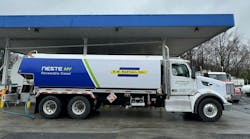Each winter, local, state, and provincial highway agencies use liquid de-icers against snow and ice. They spray magnesium chloride and calcium chloride on pavement in advance of a coming storm, or they mix chemicals with salt and sand.
“Since these chemicals don't readily evaporate and are highly soluble in water, chemical de-icers stick around and prevent ice from forming on the roadways, making snow removal easier,” said Jeff Sass, general marketing manager for PACCAR Parts. “But those same qualities make it easier for the corrosive chemicals to penetrate truck components like brakes.
“Roadleveler offers new and remanufactured brake components that can last longer and perform more reliably under these corrosive conditions,” Sass said. Roadleveler brake components are a licensed PACCAR brand of precision-fit all-make replacement parts including brake shoes and hardware kits for medium- to heavy-duty trucks.
All Roadleveler brake products meet or exceed Federal Motor Vehicle Safety Standard 121. PACCAR Parts distributes Roadleveler brake products exclusively through Kenworth and Peterbilt dealers in the United States and Canada.
“In order to eliminate uneven wear allowing for greater stopping power and longer life, each Roadleveler brake shoe is coined,” Sass said. “Coining is a form of precision stamping where each Roadleveler brake shoe is stamped like a minted coin in a 1,000-ton hydraulic press. This ensures that the radius and depth of the shoe table is manufactured to OEM tolerances.”
Coining also eliminates the gaps between the shoe table and the friction material to prevent water and road chemical de-icers from seeping behind the friction material, Sass said.
“A special anti-corrosion hydraplex enamel coating that's first applied through full immersion sets the Roadleveler product apart,” Sass said. “This full immersion doesn't leave surfaces exposed to possible environmental contaminants like chemical de-icers. Then the enamel coating is baked on at 200 degrees for several cycles to ensure proper adhesion.”
For more details, visit www.RoadLevelertruckparts.com.








